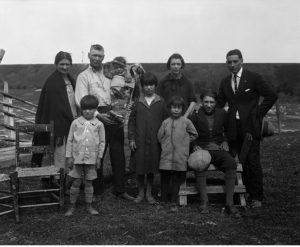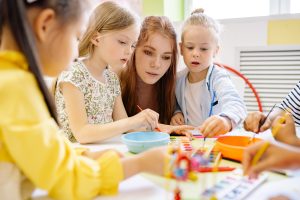The Educator’s Role in Facilitating Play-Based Experiences
11.1 Play-Based Learning
“Registered early childhood educators (RECEs) are knowledgeable about current learning theories and pedagogical and curriculum approaches that are based on inclusion and inquiry and play-based learning.” (Standard II: B.2, CECE Code of Ethics and Standards of Practice, 2017).
According to Danniels and Pyle (2018), there are two types of play-based learning: free play, which is child-directed and internally motivated, and guided play, in which some adult involvement extends the learning opportunities within the play. (CECE Practice Note: Play-Based Learning, p.2).
Educators can support play-based learning with the following:
- Interact with children in their play to extend their thinking and learning opportunities.
- Create schedules that allow for uninterrupted and extended periods of play.
- Co-plan future experiences based on observations of children’s play.
- Document children’s learning play to make learning visible.
11.2 Play-Based Learning and Pedagogical Practice
In Ontario, the College of Early Childhood Educator’s Practice Guideline: Pedagogical Practice (2020) identifies three core elements of pedagogical practice:
- Child-centered, inquiry and play-based learning
- Responsive relationships
- Collaborate inquiry and critical reflection
The Practice Guideline goes on to elaborate on the importance of play and inquiry. “By actively listening to children’s ideas and interpretations and incorporating their contributions into the curriculum you show children that they are capable contributors, their interests and questions are important, they are researchers and designers of their pathways to learning and they are valued.” (Practice Guideline: Pedagogical Practice, pg. 8)
11.3 The Educator’s Role in Supporting the Active Construction of Knowledge
Educators play a pivotal role in children’s active construction of knowledge. They intentionally provide the environments and experiences that support children in actively building concepts and skills. The role of the educator who works with young children birth to age five is to support children’s active construction of knowledge. In a sense, early childhood educators serve as research supports as the children sense, discover, and construct meaning about the world around them. Young children’s natural impulse to learn by investigating (1) what things are like and what they can make them do, and (2) how people create and share meaning shapes the role of the early childhood educator. The early childhood educator is responsible for: offering children well-stocked play spaces where they can construct concepts and ideas, preferably in the company of friendly peers; designing daily routines that invite children to be active participants and to use emerging skills and concepts; supporting children’s learning through interactions and conversations that prompt using language and ideas in new ways and that promote sharing meaning with others.
In carrying out those responsibilities, educators create contexts in which young children can:
- Wonder about what things are like and what they do.
- Investigate a variety of ways of relating one thing to another.
- Invent problems and solutions with others; construct, transform, and represent with the materials at hand.
- Create and share meaning and collaborate in learning.
- Try new challenges and practice emerging skills.
- Express their emotions, feel secure to explore, and regulate their emotions and behavior.
- Manage conflicts in ways that support the development of social skills by:
- Advocating for one’s own needs, safety, and feelings.
- Learning how to connect with their peers in mutually beneficial ways.
- Learning how to walk away or disengage from their peers when they feel the need to.
- Learning how to cope with feelings of rejection or exclusion. And in turn, learning how to seek out positive relationships, rather than dwelling on unsatisfying ones.
Indigenous Perspective

Indigenous people recognize that they have a responsibility to pass on knowledge from their ancestors to the next seven generations of children. This understanding encourages a sense of relationality by connecting the past to the present and future generations.
Early childhood educators see and support children as scientists and thus design the play environment to serve the children’s inquisitive minds. Educators also provide the materials children need to construct concepts and ideas and achieve skills in the natural context of play.
Children learn from opportunities to discover materials that they may be seeing for the first time and need time to explore and get to know the properties of these materials. It means offering children materials that they can organize into relationships of size, shape, number, function, and time. Children can investigate what happens when they put these materials together or arrange them in new ways, experiencing the delight of discovering possibilities for building with them, transforming them, or using them to represent an experience.
Early childhood educators also design daily routines as rich opportunities for children to participate actively and to use their emerging skills and ideas in meaningful situations. Equally important are the ways in which educators use interactions and conversations with children to support learning. Many interactions occur spontaneously, with the educator being responsive to an interest or need that a child expresses. Many other interactions focus on co-creating or co-constructing meaning as the educator and a child or small group of children focus on a specific topic or activity.
Some interactions may include providing guidance to help children learn to regulate their emotions and behavior or may involve an intervention in which the educator helps children explore how to negotiate a solution to a conflict.
Other interactions and conversations teachers have with children are more predictable. Educators anticipate and organize some interactions and conversations as group discussions, to prompt children’s thinking and understanding. Sometimes these groups are small, and sometimes, at preschool age, they are somewhat larger. Educators also guide some activities in a context that allows children to encounter new information and build skills. All interactions are embedded in contexts in which the children are actively engaged in exploring their own developing skills, learning from each other, and acquiring knowledge.
While play occurs naturally, educators must consider the following responsibilities when facilitating appropriate and purposeful play:
Spaces
- Are safe places to explore
- Reflect the mission and core values of the program
- Include culturally sensitive materials to explore
- Include open-ended materials for multi-use
- Are consistent and predictable
- Provide ample time for unstructured play to occur (Recommendation is 45 minutes minimum). If children aren’t provided enough time to become immersed in play, they will be less likely to engage enough to receive the benefit of the activity.
Interactions
- Stimulate creativity by asking open-ended questions or reflective observations
- Respect individual differences in play and interactions
- Encourage cooperation
- Promote children’s learning through worthwhile and challenging experiences and interactions which foster high-level thinking
- Seize opportunities during experiences and conversations to extend children’s thinking and learning
- Model and demonstrate active listening skills
- Utilize varied communication strategies, such as open questions, explanations, speculation and problem-solving
- Move flexibly in and out of various roles and draw on different strategies as the context changes
- Draw on contemporary theories and research for their knowledge and practices
- Monitor children’s well-being, life skills, and citizenship, and use the information to guide program planning
- Monitor children’s needs and interests and incorporate them into program planning
- Identify ‘teachable moments’ as they arise and use them to scaffold children’s learning and development.

Pause to Reflect
As educators, it is always good to reflect on your own childhood.
- What were your favorite play spaces as a child?
- What did you enjoy doing?
- How might you incorporate some of your childhood play ideas into your setting?
- What role did the adults play when you were a child?
- What are your beliefs about play?
- How do you think play might have changed over the past forty years?
- What impact do you think this might have on children and the adults of the future?
Important Things to Remember
- Free play is child-directed and internally motivated.
- Guided play includes adult involvement to extend the learning opportunities within the play.
- In Ontario, the College of Early Childhood Educators emphasizes that early childhood pedagogy should be child-centered, inquiry-based, and play-based.
- Young children’s natural impulse is to learn by investigating what things are like and what they can make them do.
- The early childhood educator is responsible for offering children well-stocked play spaces where they can construct concepts and ideas, preferably in the company of friendly peers; designing daily routines that invite children to be active participants and to use emerging skills and concepts; supporting children’s learning through interactions and conversations that prompt using language and ideas in new ways and that promote sharing meaning with others.
- Many learning opportunities occur spontaneously when the educator responds to an interest or need that a child expresses.
Supplemental Readings
References
Code of Ethics and Standards of Practice, College of Early Childhood Educators, 2017
Danniels E & Pyle A. Defining Play-based Learning. In: Tremblay RE, Boivin M, Peters RDeV, eds. Pyle A, topic ed. Encyclopedia on Early Childhood Development [online]. Published February 2018.
Practice Note: Play-Based Learning, College of Early Childhood Educators, 2018
Practice Guideline: Pedagogical Practice, College of Early Childhood Educators, 2020

